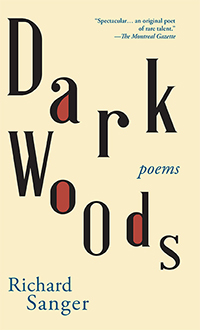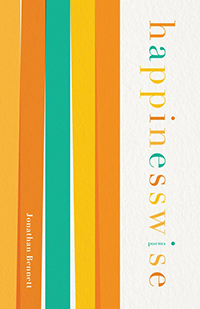Reviews
Poetry Reviews by Dennis Lewis
Richard Sanger, Dark Woods (Windsor: Biblioasis, 2018). Paperbound, 72 pp., $18.99.
Jonathan Bennett, Happinesswise (Toronto: ECW, 2018). Paperbound, 72 pp., $18.95.
 Dark Woods, the third collection by Toronto poet Richard Sanger, seems preoccupied with the porous boundaries between nature—human, nonhuman, inanimate, and animate—and our human selves. In the poems’ accentual, lightly metered stanzas we are made conscious of time passing, the body aging, and those quiet moments outside time. The title poem “Dark Woods” is emblematic of the low-key yet assured way in which Sanger presents intimate domestic moments, weaves into them images of the city or nature, and then builds complex accretions of longing, mundane reality, and literary allusion. Sanger’s bedtime ritual with his young son transforms into something much richer: “It’s November / and on this side of the wall, we look forward / to the snow, listening to the words / of an old poem that, for all I know, / embodies everything our neighbours wished to flee….” There are obvious echoes here of the Frost poem “Stopping by Woods on a Snowy Evening,” but it also suggests Coleridge’s meditative “Frost at Midnight.”
Dark Woods, the third collection by Toronto poet Richard Sanger, seems preoccupied with the porous boundaries between nature—human, nonhuman, inanimate, and animate—and our human selves. In the poems’ accentual, lightly metered stanzas we are made conscious of time passing, the body aging, and those quiet moments outside time. The title poem “Dark Woods” is emblematic of the low-key yet assured way in which Sanger presents intimate domestic moments, weaves into them images of the city or nature, and then builds complex accretions of longing, mundane reality, and literary allusion. Sanger’s bedtime ritual with his young son transforms into something much richer: “It’s November / and on this side of the wall, we look forward / to the snow, listening to the words / of an old poem that, for all I know, / embodies everything our neighbours wished to flee….” There are obvious echoes here of the Frost poem “Stopping by Woods on a Snowy Evening,” but it also suggests Coleridge’s meditative “Frost at Midnight.”
Throughout the book there’s a sense that nature and the world of inanimate forces are communicating some sort of message about life, but it’s one with which we are only haphazardly in tune. In “Rain,” the rain is “falling slant through your life, falling true,” but the poem warns, “Rain you remember does not remember you.” In “Different Parts” the speaker translates the different varieties of pears he sees into images of the world and of his lover’s body: “The most precise projections cleave / the globe into two hemispheres / that curve down the page, like the hips / you spin before the mirror.” The analogy seems somewhat contrived. But when he gets it right, Sanger’s poetry is understated and moving. “That Family Car,” for instance, features the refrain from “During Wind and Rain,” Thomas Hardy’s classic 1917 poem about human mortality and the passing of time—“Ah, no, the years, oh!” In Sanger’s revision, even the animals and the car participate in the relentless march toward obsolescence: “joints ache and creak, brakes squeak, / till our bodies give out, and we up and go, / as the junkyard calls: ah, no, the years, oh!”
 Jonathan Bennett’s new collection (his third), Happinesswise, gives the impression of diffuseness and fleeting impressions derived from accidental encounters with ordinary phrases, objects, and the mundane, even while its individual poems are fairly structured. Happinesswise is clearly about happiness and the criteria people use to gauge it—or its opposite—in their lives. In some cases, these criteria establish life lived as a catastrophe. All of the poems within the book’s five parts are pervaded by the presence of death, mentioned directly or obliquely.
Jonathan Bennett’s new collection (his third), Happinesswise, gives the impression of diffuseness and fleeting impressions derived from accidental encounters with ordinary phrases, objects, and the mundane, even while its individual poems are fairly structured. Happinesswise is clearly about happiness and the criteria people use to gauge it—or its opposite—in their lives. In some cases, these criteria establish life lived as a catastrophe. All of the poems within the book’s five parts are pervaded by the presence of death, mentioned directly or obliquely.
The first part—“Palliative Care Reflective Portfolio”—records different patients’ end-of-life impressions. The discordance between the clinical language they hear around them and the delicate lyricism of their innermost thoughts is emphasized to powerful effect. Beneath the fog of pain, medication, and deathbed commiserations, the poems suggest, we are all finally alone with our little stories, which both torment and bring us comfort.
The second part—“Concession Lines Signs”—features clever, technically adroit poems whose titles are based on traffic signs. The poems evoke the landscape and social milieu of the author’s rural Peterborough. In “Vegetarians Use the Back Door” good-ol’-boys at a rib festival chug beer and speak their hoser argot while terrorizing the vegetarian narrator: “Then he shoots you a look. Yes you, / broccoli boy. Come party with us then.” It’s a wry and hilariously spot-on piece of social observation, capped with the narrator’s mingled sense of fear, weakness, and self-loathing: “Just how were you holding your face?” Sometimes, though, the tone seems less wry than too-clever-by-half, as in the opening of “Traffic Calming Ahead”: “I see the laser eye, like a bindi / between descending digits each / an eyelid batting numbers until / I back off to rickshaw speed….” When the poems resist that urge—“Signs for butter tarts and bait / glide by until the exiting traffic…”—there is a precision and lyrical swagger about them.
In the third section of the book, titled “Neurological Sketches,” Bennett presents a series of poems depicting aspects of his relationship with his autistic son. In fine, concatenate poems the author suggests the various ways his son has changed his life:
Air brakes expel, he ducks
as if shot at, flaps, we normalize
the autistic moments for passersby
who flip us stares of weird or pity.
The poems in the book’s final two sections are technically accomplished, displaying Bennett’s mastery of sound and phrasing. Not all are fully accessible, though; some allusions seem obtrusively obscure rather than illuminating. In “Notes After Glasgow,” for instance, the narrator puzzlingly describes soaring “across the Firth of Forth to Bass Rock— / as we did when ‘the War of Rough Wooing bypassed / Tantallon due to the Earl’s English sympathies.’”
But in the more successful poems such as “Audley Elegy” or “Let Me Speak Softly of Two Days,” the formal control and musicality help the poems soar above such mundane concerns as ascertaining their references. “Audley Elegy” memorializes Bennett’s childhood in the Australian bush, yet the exquisite lyricism of its couplets touches a region of universal memory far beyond specific referents: “There are currawongs / in the ghost gums, galahs in the kurrjongs / and Ivy skips off counting fairies with Nanny.”
By the time I reached the book’s title poem “Happinesswise,” I got the sense that Bennett’s collection is as much concerned with exploring the different operations poetry puts in process as it is with the many variations of what people believe is happiness. This collection’s theme is handled diffusely, but its pleasures—and there are many—accumulate steadily throughout the book.
—Dennis Lewis









